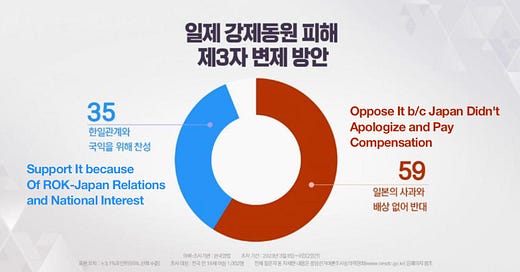Japan Needs to Give Korea Something in the Forced Labor Deal
South Korea offered Japan many concessions. Japan needs to offer something in return for this deal to be a sustainable compromise and to gain support in the ROK.
The agreement Korean president Yoon Suk-yeol announced to reopen relations with Japan gave Japan a lot of concessions for free without asking for much in return. The Republic of Korea dropped demands for Japan to compensate the victims of forced labor during World War II, and they are instead to be compensated by a group funded mostly by Korean companies.
The U.S. and the Yoon administration hailed the deal as a step forward for Korea’s diplomatic and military relations that would help gain Japanese cooperation on North Korea and other critical issues. It may end up bearing fruit in foreign policy and trade. But only if it remains enforced and relations with Japan remain positive.
If Koreans feel their problems with Japan are not solved, and if they protest and push a future president to back down on Yoon’s deal (not the Assembly’s deal, not a court-ordered ruling, not a deal supported by the public), then Japan, Korea, and the United States will be back in the same place.
The initial surveys showed Koreans thought the deal did not solve their problems with Japan.
A Gallup Korea survey in early March found that only 35% of Koreans supported the deal. (In Japan, 57% support it, and 33% are opposed.)
The decision by Japan’s education ministry on Tuesday to approve of textbooks that deny Japan forced Koreans and Chinese to work in the mines will not help promote the deal’s popularity.
"To address a shortage of manpower amid the prolonged war, Joseon (Korean) people and Chinese were forcibly mobilized for mine works," the earlier textbooks read. But in the revised versions, the term "forcibly mobilized" was replaced by "participated," distorting the coercive nature of the mobilization.
Japanese textbooks have long been an area of controversy between Japan and its Asian neighbors, which were occupied by Imperial Japan. One would think the two countries should have discussed how they would address the teaching of history, given that it is a big part of what this controversy is all about in the first place. The victims who brought the case said they were looking for justice more than money. A majority of the Korean people want historical justice.
Even the original textbook acknowledged that Japan engaged in forced labor. These textbooks are not just maintaining Japan’s stubborn and historically-inaccurate position but rather moving in the opposite direction at a time when Korea’s government is reaching out to Japan.
So what did Korea get from an agreement that is ostensibly supposed to help solve a diplomatic dispute stemming from a 2019 court ruling finding Japanese companies guilty of coercing Koreans into uncompensated labor?
Compensation funded mostly by Korean companies
No apology
No admission of forced labor
Japanese textbooks continue to deny Japan’s abuses—and in some cases are being modified to even deny what they had previously admitted
No wonder the agreement is unpopular in Korea.
Korean President Yoon Suk-yeol took a risk to put his reputation and political capital behind a controversial deal because he valued Korea having a relationship with Japan. Could Japanese PM Fumio Kishida take on some risk too to make this deal work?
Enjoy this article? Share it on Twitter and tag @USKoreaPolicy! Give a donation to support this publication at Ko-Fi! Or become a paid subscriber now (and try for free for 7 days) to read more!
Korean Court Orders Compensation for Vietnamese Victims of Korean War Crimes
In a related story, the Yoon administration is appealing a ruling by Korean courts that Korea must pay compensation to victims injured by Korean soldiers during the Vietnamese War.
Keep reading with a 7-day free trial
Subscribe to Korean Policy and Culture: The US-Korea Policy Project to keep reading this post and get 7 days of free access to the full post archives.




